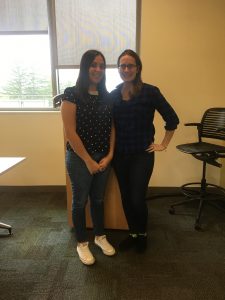Interview with My Professor – Women in STEM

It has only been a couple weeks since I arrived in the United States, and I am enjoying every minute of it. I love Nazareth College; the campus is beautiful and everyone is very nice. My favorite thing so far about Nazareth is that 4 out of 5 of my professors are women. This is amazing, because it is somewhat rare in the sciences, and now I have more positive strong female role models to admire and look up to.
I decided to interview one of my professors, Dr. Lauren Brooks, who is a visiting assistant professor in Chemistry Laboratory Sciences. By sharing this interview, I hope to encourage other girls who hope to make a career in the sciences. Dr. Brooks is just one of many pioneers who helps us remember what it has taken for women to succeed in STEM fields. Diversity and inclusion make the sciences better – the more diverse the scientific community is, the more new and fresh ideas arrive to solve problems and drive discovery.
What made you choose science as your career path?
For Dr. B (as we call her in class), everything started in her 8th grade Chemistry Class. Valence electrons and chemical bonding captivated her. Her teacher also saw her talent and pushed her harder, which led Dr. B to continue exploring the sciences in high school. Also, the movie Outbreak (about the Ebola outbreak), grabbed her attention. She thought being a detective and rising against a deadly disease was neat, only to find out later in life that studying super deadly stuff was not for her.
Do you regret your decision of choosing science?
Dr. B regrets nothing about becoming a scientist. Sometimes she wishes she would have realized that Clinical Laboratory Sciences was her thing instead of engineering, where she spent two years before realizing it was not for her. She’s okay with that decision because if she did not go to an engineering university she would not have met some of the very important people in her life.
What was the hardest part of choosing science?
It was difficult to decide what she wanted to research for her PhD. It was also difficult to embrace failure. Even though it was hard to adapt, it helped her learn that failure is just a part of being in the science field, and that ultimately you learn more from your failure than from your success.
What is your favorite part of your jobs (teaching and science)?
Teaching: Being able to connect with her students. She is happy to spend 20 minutes on a single slide, if she knows her students got the concept. The fact that she can build a foundation for her students (about a certain topic) and hopefully inspire them to want to learn more. Talking with them outside class about a topic they are really excited about is what makes Dr. B smile and feel proud of her job.
Lab: Graduate research! In the clinical lab she enjoys the fact that you are working with patient samples, so you are finding out what is causing a disease in the patient and you are finding a diagnosis.
What is you least favorite part of your jobs?
Teaching: Grading (laughs). It takes time to write proper questions that give the student space to talk about and apply what they know, and that can be subjective. She would rather know what the student is thinking about a topic than just see you guess at a memorized concept.
Lab: Not having enough time to process all the samples as soon as she gets them because her shift is coming to an end. The faster the samples are tested, the faster the results, the faster a patient can be treated and taken care of.
What advice would you give to young girls thinking about science as their potential career path?
Go for it! But only if you are passionate about it because it’s not going to be easy. Right now, there are more workplaces that are supportive of women in the sciences. However, there is still not much support for women starting a family, and there is still stigma about being a mom and a scientist. There is hope, and you can always find a support system. Always remember to learn from your failures. Use failure to be a better scientist and have confidence in yourself.
By Maria Paula Vargas Morales, 2019-20 Global UGRAD from Costa Rica at Nazareth College